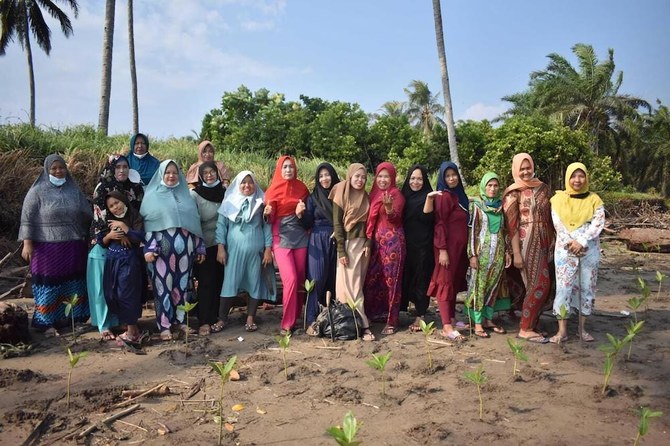JAKARTA: For the past few years, Rania has been constantly living in fear of the day she and her family would have to abandon their home when everything they own falls into the ocean.
Life and livelihood in Rania’s village, Pondok Kelapa in Bengkulu province on the western coast of Indonesia’s Sumatra Island, have been increasingly affected by erosion.
Environmentalists estimate that seawater has already entered 30 m into the mainland since 2011 and the pace at which it reclaims more is increasing.
The village has been also losing its main source of livelihood, fisheries, as tidal waves destroy marine vegetation and fish habitats, leaving many men jobless and trapping the whole community in a poverty cycle.
“Where we live is being eroded by the waves. Tidal floods are greatly affecting our lives,” Rania, 47, told Arab News.
“We are trying our best, but some children don’t go to school. Some of them have had to leave because there’s simply not enough money.”
Pondok Kelapa is not the only place affected, as coastal erosion and tidal flooding are threatening many more communities in the archipelagic nation of 270 million.
A recent study by Indonesia’s biggest daily, Kompas, showed that nearly 200 out of about 500 coastal cities and districts are at risk of being submerged by 2050, as the country is one of the most vulnerable in terms of risks posed by the changing climate.
In Rania’s village of 4,300 people, women have decided to fight back.
In 2020, she and over 20 other village women formed a group to advocate for government climate resilience assistance to build a seawall and help the community adapt to the rapidly changing conditions with proper infrastructure.
“Because of climate change, seawater has increasingly eroded our place in Pondok Kelapa,” she said.
“Now the women are stepping up and trying to confront this issue. Who knows, maybe the government will respond to us ladies.”
Action is urgently needed not only in Pondok Kelapa but along the coast of the whole Bengkulu province, according to the Indonesian Forum for the Environment, a non-governmental organization, which is part of the Friends of the Earth International network.
“A number of villages are in danger of sinking because of coastal erosion and tidal flooding…These tidal floods in Bengkulu province are very hard to predict, and they have impacted the earnings of fishermen and subsequently affected their livelihood,” Dodi Faisal, who heads the forum’s advocacy in the province, told Arab News.
“It’s very worrying. The provincial and local governments have yet to take any concrete action.”
Masmarawati, another member of Rania’s group, said she hopes action will come soon.
“We can still survive in the village for now,” she said.
“But what about next year? In five years? What’s going to happen to our children and grandchildren?”


























